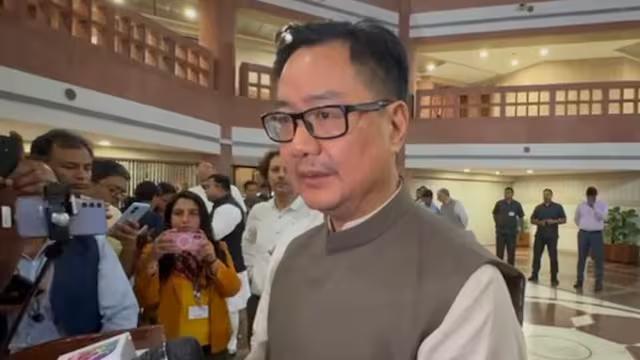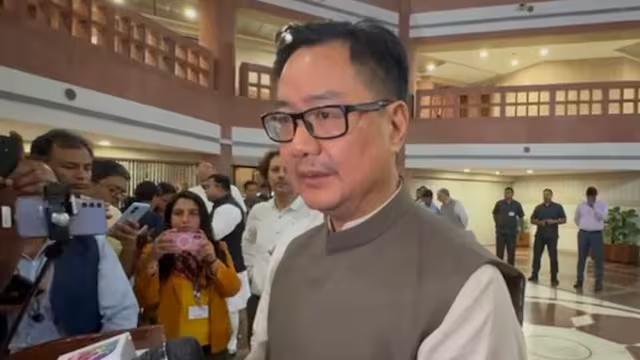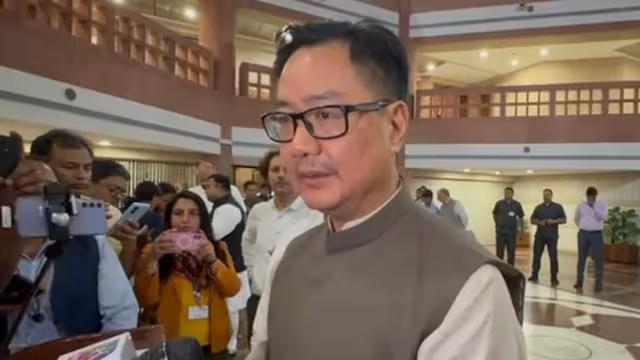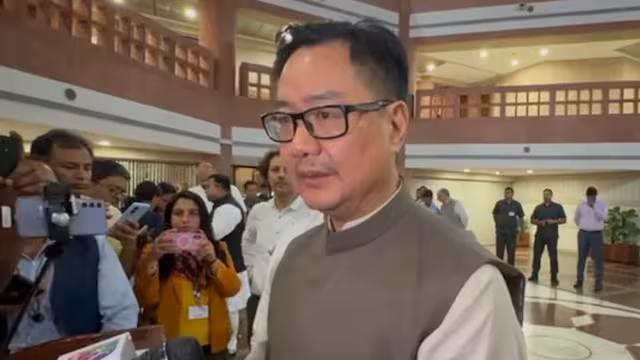
All Parties Unanimously Supported Action Taken by Govt After J&K Terror Attack: Rijiju
In the aftermath of the recent terror attack in Pahalgam, Jammu and Kashmir, the Indian government has been working tirelessly to ensure that those responsible are brought to justice. In a significant development, Union Minister Kiren Rijiju has revealed that all political parties have unanimously supported the action taken by the PM-led Cabinet Committee on Security (CCS) to tackle terrorism in the region.
Rijiju, who is the Minister of State for Home Affairs, made this announcement on Thursday after an all-party meeting was convened to discuss the situation. The meeting, which was attended by Defence Minister Rajnath Singh, was seen as a crucial step in building a unified front against terrorism.
Speaking to reporters after the meeting, Rijiju said that the Indian government has expressed its intention to take more stringent action against terrorism. He emphasized that all political leaders present at the meeting were in full agreement with the government’s stance on the issue.
“The Indian government has also expressed its intention to take more stringent action today,” Rijiju said, without giving further details on what these measures might entail.
The Pahalgam terror attack, which took place on October 11, resulted in the deaths of at least 10 people, including a police officer. The attack was carried out by a group of terrorists who were hiding in a forest area in the Anantnag district of Jammu and Kashmir.
The Indian government has been under pressure to take decisive action against terrorism in the region, which has been plagued by violence and militancy for decades. The recent attack has only added to the sense of urgency and the need for a comprehensive strategy to deal with the problem.
The all-party meeting was seen as an important step in this direction, as it brought together leaders from various political parties to discuss the situation and find a way forward. The meeting was attended by representatives from the BJP, Congress, National Conference, Peoples Democratic Party, and other parties.
The fact that all parties present at the meeting supported the government’s action is a significant development, as it suggests that there is a broad consensus on the need to take tough action against terrorism. This unity of purpose will be crucial in the days ahead, as the government works to implement its plans to tackle terrorism in Jammu and Kashmir.
The Pahalgam terror attack has also led to a renewed focus on the need to improve intelligence gathering and sharing between different agencies. There have been reports that the attackers were able to carry out the attack despite being tracked by intelligence agencies, which has raised concerns about the effectiveness of the country’s intelligence gathering capabilities.
In the wake of the attack, the Indian government has announced a number of measures to improve intelligence gathering and sharing. These include the setting up of a new intelligence agency, the Indian Intelligence Agency (IIA), which will be responsible for gathering and analyzing intelligence on terrorist activities in the region.
The government has also announced plans to increase the budget for intelligence gathering and sharing, and to provide additional resources to intelligence agencies to help them carry out their work more effectively.
While the all-party meeting was seen as an important step in building a unified front against terrorism, there are also concerns that the government’s plans to tackle the problem may not be enough. Some critics have argued that the government’s approach to terrorism is too narrow and that it needs to take a more comprehensive approach to address the root causes of the problem.
The Pahalgam terror attack has also led to a renewed focus on the need to improve the security situation in Jammu and Kashmir. There have been reports of increased militant activity in the region in recent months, which has raised concerns about the ability of the security forces to deal with the situation.
In the wake of the attack, the Indian government has announced plans to increase the number of security personnel deployed in the region and to improve the security infrastructure in place. These measures are seen as crucial in helping to prevent similar attacks in the future.
In conclusion, the all-party meeting on the Pahalgam terror attack was a significant development in the fight against terrorism in Jammu and Kashmir. The fact that all parties present at the meeting supported the government’s action is a clear indication that there is a broad consensus on the need to take tough action against terrorism.
As the government works to implement its plans to tackle terrorism in the region, it is clear that there is no room for complacency. The Pahalgam terror attack has highlighted the need for a comprehensive approach to addressing the problem, and for the government to take decisive action to prevent similar attacks in the future.





